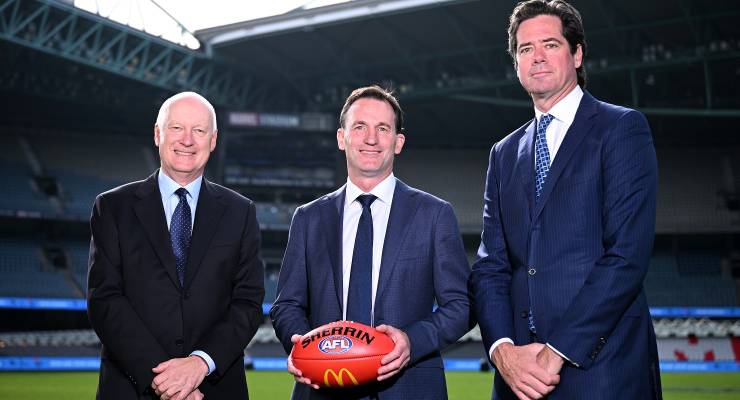
It’s been more than a year since Gillon McLachlan announced his resignation as AFL CEO at an emotional press conference, but finally the hunt for his replacement has concluded. The protracted search, which scoured the country for potential successors, finally finished up within AFL House and the internal appointment of the executive general manager of football operations, Andrew Dillon.
It is far from a bold or risky appointment — it calls to mind a football team with a narrow lead playing the ball around late in the game to avoid a loss. American journalist Sydney J Harris once mused that “our dilemma is that we hate change and love it at the same time; what we really want is for things to remain the same but get better”. This is often the way things are in sport: the old institutions are slow to change, afraid to make any sudden movements and jeopardise all that they have spent years building.
When McLachlan steps down in October, the heir to his throne will be made in his image — another privately educated white man in his early 50s with a long history as an amateur footballer and a professional football administrator. The reassurance to those watching is built into this appointment: the AFL will not stray from its core values, and there is no cause for concern. This assessment of the situation was reiterated in the endorsement of Dillon during the press conference on Monday by AFL chair Richard Goyder AO.
“Andrew has been a key leader and voice in every decision we have made as an organisation for many years, and he brings not only experience across both elite and community football but also a key involvement in our major broadcast and partnership deals and in developing and shaping the AFL’s response to a number of key social issues,” Goyder said.
In other words, it is likely to be business as usual at AFL House, with nary a change to the decor let alone sweeping reform to the way the sport is run.
McLachlan will walk away having steered the organisation through some particularly momentous times during his tenure as CEO: the delivery of the COVID-impacted seasons of 2020-22, the negotiation of a new broadcast deal in 2022, and most notably the introduction of the AFLW competition in 2017.
Importantly, he remains untouched by scandal, escaping the fate that has befallen many a sporting CEO. But neither has he enacted extensive change. The pandemic changes to the competition were unavoidable — a result of reactive, rather than proactive evolution. A women’s competition was seen by many to be well overdue by the time it was introduced, having first been slated for 2013 and with women having participated in organised football competitions since the early 20th century.
What lies ahead for Dillon is the opportunity to create his own legacy, one separate from his 23-year residence at AFL House. His comments at his press conference were promising, speaking warmly of inclusion across the sport from grassroots to the elite level.
“It is really important that we are a game for everyone, a game that is accessible, affordable and safe and a game where everyone feels welcome,” he said.
The challenge now is for him to take the time to learn what it means to create this space within the AFL. He does not bring the lived experience of an outsider to the game. He does not know what it is like to learn English as a second language, to face racism on the field, to grapple with his sexuality or gender identity amid a heterosexual sporting culture — or to be the only woman in a room where decisions are being made. But he has the power to amplify the voices of those who have those experiences, to understand what they love about football and elevate those features of the game.
The appointment of Dillon in itself may not have been revolutionary or even much of a tweak to the status quo, but every change presents the opportunity to do things differently. Dillon has five months to warm up to the role and consider how he wants to start building his legacy.
Any tips for the new AFL CEO? Let us know your thoughts by writing to letters@crikey.com.au. Please include your full name to be considered for publication. We reserve the right to edit for length and clarity.








And as for private enterprise, especially boofheaded footballers bullying Governments to build yet more stadiums and on prime land no less, that should be a Capital Offence, with at least 10 years at His Majesty’s Pleasure.
Arrogant AFL is no better than IOC, AOC and FIFA with its leaning on politicians to spend big on sports facilities. Hobart’s stadium will likely go over $1B with little paid for by AFL. Pork barreller Shedderjiklian made an art form of funding stadiums.
So just to run a thought experiment – if the appointment had been a privately educated white woman in her early 50s it would have been ok ? Or a state school educated ostensibly white man but whose mother was born in the north of Spain in his late 30s ? Or a home schooled brown skinned non-binary who just celebrated their 29th birthday who has never played AFL but was keen to understand more about the game ?
Stopped (vaguely) following AFL last century due to list churn over, inward looking, PR construct all over media, while both the type of player and tactics have changed (inc. import of negative football tactics e.g. kicking backwards to retain possession) and few if any medium height players (cf past).
In recent years rusted on AFL following friends complain about how, probably due to high minimum salaries over decades, send their kids to private schools which become joined at the hip, but possibly at the expense of state high school pathways, lower bush or suburban tiers and short-medium height; on the latter football is the winner with more mobility and opportunities for males and females.